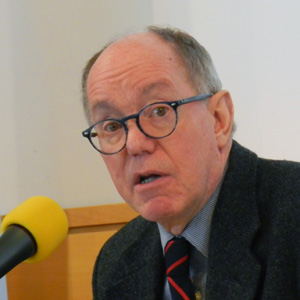

On 16 February 2016, Mark Hibbs, Senior Associate in the Nuclear Policy Program at the Carnegie Endowment for International Peace, presented an overview of key findings from his research on the Nuclear Suppliers Group (NSG) and NPT Non-Parties. Hibbs discussed the policy issues at stake behind current deliberations taking place within the NSG concerning the potential risks and benefits of the group admitting states not party to the Treaty on the Non-Proliferation of Nuclear Weapons (NPT).
The NSG, the most important multilateral nuclear export control rule-making arrangement, was established after India tested a nuclear explosive device in 1974. The NSG's 48 participating governments (PGs) are considering whether to admit India—a state not party to the NPT that possesses nuclear weapons—as a member.
Before the NSG takes that decision, Hibbs argued, its PGs should have a policy governing the participation of candidate states that are not party to the NPT. Hibbs stressed four main reasons why such a policy is needed: (1) nuclear supply capabilities of states outside the NSG, particularly those with significant sensitive capabilities; (2) nuclear weapons capabilities in South Asia; (3) key PGs' advocacy of Indian membership to the NSG; and (4) the lack of clarity about the NSG's non-proliferation "mission".
Although some key PGs are advocating Indian membership in the NSG—for both nuclear export control related and geostrategic reasons—there is currently no consensus on India's admission. PGs are divided as to whether and under what conditions India should be granted admission to the NSG.
Since 1992, the NSG has required an IAEA full-scope safeguards (FSS) agreement as a condition for the future supply of NSG "Trigger List" items to any non-nuclear-weapon state—to ensure that only NPT states and states with FSS agreements in place would be able to benefit from nuclear transfers. At the time, no non-NPT state had declared nuclear arsenals. Since 1998, India and Pakistan have declared their nuclear weapons programmes. Both of these South Asian states possess the advanced sensitive nuclear technology for peaceful and military purposes, which makes their adherence to non-proliferation measures and NSG guidelines of interest to many PGs.
Since the bilateral nuclear cooperation agreement between the US and India—and the 2008 NSG exception to the FSS rule of supply—key NSG states are now advocating India's membership to the NSG. The decision to grant India membership in the NSG may have direct implications for non-proliferation norms on which the nuclear non-proliferation regime rests.
Specifically, Hibbs cautioned that the decision on India's membership must be taken with care as this will define the relationship between the NSG and the NPT. The fundamental importance of NPT status and membership for a candidate's qualification for NSG membership needs to be assessed. In doing so, compensatory non-proliferation actions by non-NPT states to address eligibility factors not met also need to be carefully assessed.
Adherence — as opposed to membership — was also briefly discussed as a possible alternative model for future NSG relationships with non-NPT states. One non-PG, non-NPT state—Israel—already formally adheres to NSG guidelines. As the PGs continue to deliberate on the possibility of Indian membership, the tangible benefits of admitting non-NPT states to the NSG will have to be weighed against the risks and potential damage to the nuclear non-proliferation regime.